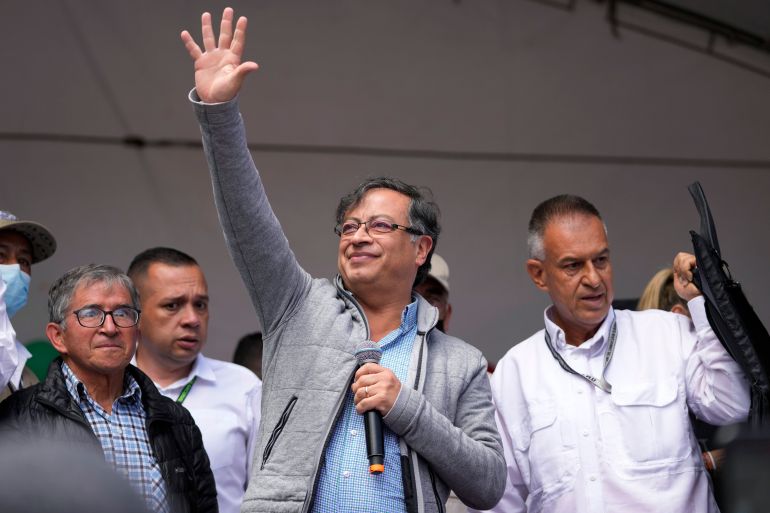Colombia’s President-elect Petro calls for ELN talks, ceasefire
The left-wing leader says he has sent a message that it is a ‘time for peace’ to the country’s last major rebel group.

Colombia’s President-elect Gustavo Petro has proposed a “bilateral ceasefire” with the National Liberation Army (ELN), the last major rebel group in the country, in hopes of restarting stalled peace negotiations.
Petro, who is a former rebel with the M-19 movement and is set to be the country’s first left-wing president, said on Tuesday he had “sent a message” to the ELN and “all existing armed groups” that the “time for peace has come”.
Keep reading
list of 3 itemsColombia election: Latin America leftist leaders praise Petro win
FARC dissident leader killed in Colombian army operation: Duque
“What I request is a ceasefire that will be bilateral,” he said, adding the aim of the pause in violence would be “to bring an end to the war in Colombia”.
Talks with the ELN, which unlike the Revolutionary Armed Forces of Colombia (FARC) group did not lay down arms under Colombia’s 2016 peace agreement, broke down under outgoing President Ivan Duque following a 2019 attack on a police academy in the capital, Bogota, that killed 22.
Duque has insisted that the ELN, formed in 1964 after the Cuban communist revolution, cease all activities for talks to resume. The group, meanwhile, promised “reprisals” after commander Angel Padilla Romero was killed in 2021.
Petro, the former mayor of Bogota, had pledged to talk to the ELN prior to his election victory in June, following which the group said it was ready to reopen negotiations.
The ELN’s central command said it was “keeping its system of political and military struggle and resistance active, but also maintaining its clear availability to advance the peace process”.
The ELN currently counts about 2,500 fighters among its ranks, according to Colombian military estimates, and has extensive support network in urban centres, mostly on the border with Venezuela and along the Pacific coast.
Speaking on Tuesday, Petro also reiterated he hoped to re-establish ties with Venezuela to help to dislodge armed groups active along the two countries’ shared border.
Duque has repeatedly claimed Colombian armed groups are taking refuge in Venezuela with cooperation from the government, a claim Caracas denies.